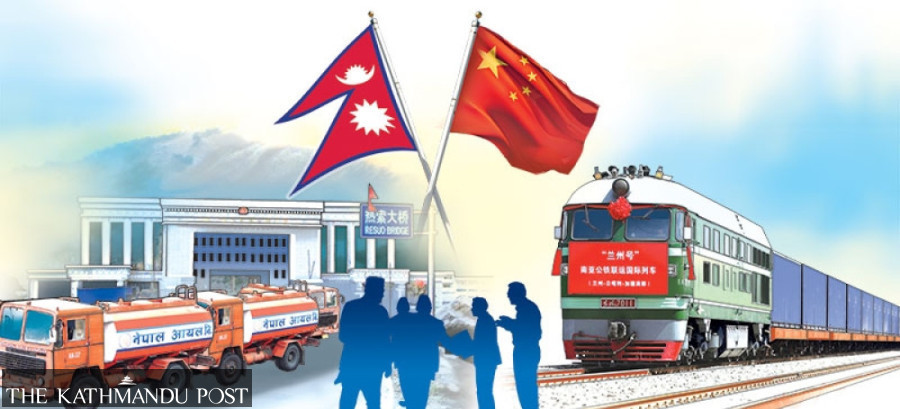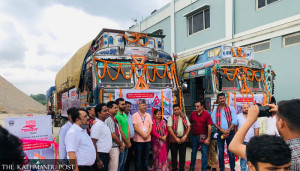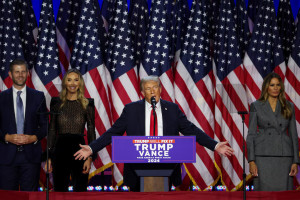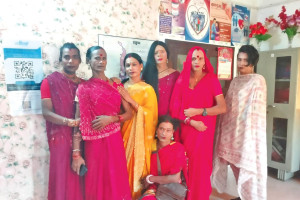National
BRI debate drags on as Chinese envoy lobbies Congress
Differences persist over law enforcement cooperation and developing common positions in international forums.
Anil Giri
The conundrum over signing of the Implementation Plan of the Belt and Road Initiative during Prime Minister KP Oli’s upcoming China visit persists. Two key ruling parties—the Nepali Congress and the CPN-UML—remain at odds over several proposals in the implementation plan.
Besides holding regular communications with Prime Minister Oli and senior UML leaders, Chinese Ambassador Chen Song has intensified diplomatic lobbying within the Nepali Congress in order to drum up support for the signing of the implementation plan during Oli’s visit, which is scheduled for the first week of December. An official announcement of the visit, however, is yet to be made.
Recently, according to Congress leaders, the Chinese envoy has met Congress Vice President Purna Bahadur Khadka, senior leaders Shekhar Koirala, Bimalendra Nidhi, and Minendra Rijal, among others, to get the desired support.
Oli and his party have expressed their intent to sign the BRI implementation plan, but the Congress remains wary about signing such a document. The party, however, recognises the BRI and is keen to develop connectivity and infrastructure projects on a project-by-project basis.
During his first visit to China in 2018, Prime Minister Oli had proposed 35 projects under the BRI and these were later whittled down to nine at China’s request, an office bearer of the Nepali Congress said. “We want to follow the same modality of negotiating individual projects under the BRI, and the investment model should be decided through such negotiations,” he said.
Congress General Secretary Gagan Thapa said the party’s position on BRI projects is clear. “Be it a loan or a grant, we prefer negotiating individual projects with China.”
Several Congress leaders familiar with the BRI implementation plan document have said that Nepal should not sign any document with broader strategic and geopolitical implications.
The draft of the BRI implementation plan seen by the Post reads: “As per the understanding reached during Chinese President Xi Jinping’s state visit to Nepal on October 12-13, 2019, the two sides decided to, on the basis of the five principles of peaceful coexistence, the UN charter and principles of good neighbourliness, elevate Nepal-China Comprehensive Partnership of Cooperation Featuring Ever-lasting Friendship to Strategic Partnership of Cooperation Featuring Ever-lasting Friendship for Development and Prosperity.”
The draft document further says “the two sides also decided to strengthen the all-round cooperation and promote the overall development of the bilateral relations and based on consensus reached at the highest political level.”
Prime Minister Oli and Nepali Congress President Sher Bahadur Deuba met on Monday to discuss the BRI implementation plan before giving their final word to the Chinese side.

Officials at the Ministry of Foreign Affairs and the Ministry of Finance urged the political leadership to quickly decide on the plan, with Foreign Minister Arzu Rana Deuba heading to China on November 28 to meet her Chinese counterpart Wang Yi in Beijing on November 29. The two sides are expected to finalise the agenda of Prime Minister Oli’s visit and the agreements and MoUs to be signed.
“We are waiting for the political leadership to take a final call,” a joint secretary at the Ministry of Foreign Affairs said. “A counter proposal will be sent, seeking some amendments to the implementation plan.”
“We have reservations as the document mainly reflects Chinese priorities rather than ours. The plan should be such that we too can own it up and be able to derive tangible benefits. We want to see our projects, priorities and terms reflected in any discussion on the BRI,” said an official at the Ministry of Finance, and his ideas were seconded by another official at the foreign ministry.
Officials at the two ministries said they want to narrow down differences between Nepal and China on the BRI implementation plan and propose changes in areas such as cooperation among law enforcement agencies, cooperation in science and technology, and a common position between Nepal and China in international forums.
Under the “cooperation principles” in the draft agreement, the Chinese side has proposed joint consultation for common development where both sides will uphold the spirit of the Silk Road, respect each other’s sovereignty and core national interests, and work together to improve people’s livelihoods through mutually beneficial cooperation.
The Chinese side has proposed several initiatives under the subtitles “pragmatic cooperation for meaningful effects” and “market orientation with government guidance” and offered to jointly develop the Trans-Himalayan Multi Dimensional Connectivity Network through the construction of ports, roads (including bridges and tunnels), railways, aviation infrastructure, telecom projects, and electricity transmission lines.
“The two sides will utilise existing China-Nepal intergovernmental consultation and cooperation mechanisms for advancing cooperation under the BRI, and carry out the China-Nepal cross border railway project, including tunnels along the roads (Kerung-Kathmandu) after the accomplishment of feasibility study,” the Chinese proposal reads.
It also mentions that the two sides will cooperate on the construction of cross-border road and tunnel projects, dry ports, integrated check posts, a China-Nepal friendship industrial park, and enhance cross border economic cooperation.
During Oli’s visit, the Ministry of Foreign Affairs plans to sign a memorandum of understanding for the construction of the Tokha-Chhahare tunnel project, with Nepal’s Ministry of Finance and China International Development Cooperation Agency (CIDCA) as signatories.
Similarly, the Chinese side has proposed co-building the ‘Air Silk Route’, which will involve close communication on traffic rights agreements, the development of and opening of additional air routes, and the enhancement of aviation logistics infrastructure. “Both sides aim to expedite efforts to implement relevant transit transport agreements by improving infrastructures, procedures and coordination,” said the draft plan.
Under the subtitle “Trade, industrial capacity and investment modality,” the plan proposes enhancing cooperation in bilateral trade and trade infrastructure, improving border cargo facility, promoting e-commerce, promoting capacity building, and sharing best practices and innovative experiences.
“The two sides will strengthen cooperation in energy development by doing feasibility studies, building cross-border transmission lines and carrying out power trade for the utilisation of energy resources,” said the plan where it is also stated that the Chinese side will facilitate Nepal’s participation in the China International Import Export Expo and similar expos.
Under the title “Economic and financial sector cooperation,” the Chinese side will support Nepal’s development efforts under the BRI by providing financial and governmental assistance. Both sides will, under the Guiding Principles on Financing the Development of the Belt and Road Principles and green investment principles for the BRI, explore various financing cooperation modalities.
The financial institutions of the two countries will be mobilised, innovative financial models will be developed, and the opportunity for the utilisation of diversified financing tools will be explored to finance bilateral projects.
“The two sides will explore the possibilities of implementing new and innovative project financing instruments, as appropriate, such as public private partnership and blended financing,” states the plan document seen by the Post.
The plan also proposes a long list of cooperation models between the central banks of Nepal and China, including the possibility of trading in local currencies for bilateral trade transactions.
Other areas of cooperation identified in the BRI implementation plan include education, science and technology; intellectual property, measurement, standards and conformity assessment cooperation; agriculture, forestry and water conservation sector; energy saving and environmental protection; geosciences sector; customs clearance; health sector cooperation; and cultural and tourism exchange.
The Chinese side has proposed numerous new projects and programs under the framework of BRI and other forums. It also stated that the leaders of the two countries will continue to meet, and close communication will be maintained between the government sectors of the two countries at multilateral and bilateral events—an approach that, according to Nepali officials, the Nepali side has objected to.
The plan will be effective from the date of signature and will remain in effect for five years, upon the expiry of which it will be automatically renewed for successive five-year periods unless either side notifies the other side in writing of its intention to terminate it—at least three months before its expiry.
Amrit Rai, spokesman of the foreign ministry, said the status of the BRI implementation plan is under discussion at the top political level and he thus has no updates. He added that the ministry has been receiving dozens of project proposals from line ministries in lieu of Prime Minister Oli’s impending China visit.




 20.12°C Kathmandu
20.12°C Kathmandu















